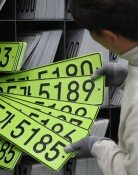Unsatisfactory Korea-U.S. nuclear deal
Unsatisfactory Korea-U.S. nuclear deal
Posted April. 23, 2015 07:23,
The Korea-U.S. nuclear agreement, which had been criticized as an unfair one has been struck in four years and six months. The agreement was signed in 1974 after Kori 1 nuclear power plant was introduced in 1972, but it was needed to be updated because it could not catch up with the development of the Korean nuclear industry. Korea demanded two things: the right to enrich uranium and reprocess spent nuclear fuel. It needs to enrich uranium to have a stable supply of nuclear fuel for the operation of nuclear power plants. It also needs to reprocess spent nuclear fuel because the temporary storage facilities are almost full. It can be more competitive in exporting nuclear plants only when it can enrich uranium and reprocess spent fuel like France.
The outcome of the negotiations is disappointing, however. The two countries agreed to allow Koreas enrichment of U.S.-origin uranium up to 20 percent and only the initial stage of reprocessing capabilities. Enrichment and reprocessing are permitted but only with Washingtons agreement.
Twenty percent is the maximum level that the International Atomic Energy Agency allows for nuclear plant fuel. If the percentage is higher than that, it could suspect a nuclear bomb. Japan can enrich more than 20 percent, however. Although Korea is the worlds fifth largest nuclear power house and has used nuclear power peacefully, the deal seems to say that the Korea-U.S. alliance is not as trustworthy as the U.S.-Japan alliance.
Another problem is that the urgent issue of handling spent nuclear fuel is postponed to be a long term agenda. Although the deal allowed independent storage facilities, reprocessing, permanent disposal, and reprocessing in other countries, it is not enough because the storage facility for high-level waste will be saturated next year. Korea and the U.S. are developing ways to reprocess nuclear fuel through an experimental method called pyroprocessing, but they cannot guarantee a success now. Koreas nuclear sovereignty is more prominent when it is compared to Japan to which Washington granted the right to enrich uranium and reprocess spent fuel through the revisions of the pact in 1968 and 1973.
Korea has been pursuing the peaceful use of nuclear energy. It is also firmly committed to the principle of non-proliferation, President Park Geun-hye said in her speech to U.S. Congress in May 2013. We need a modernized, mutually beneficial successor to our existing civil nuclear agreement. Such an accord will bring huge benefits to related industries in both our countries. U.S. President Barack Obama said that he would order his administration to conclude the case as soon as practicable. Now, the Korean government praises itself, saying, This revised pact addressed all of unequal items and also resolved urgent issues. However, if tangible results are merely a stable supply of nuclear fuel and the creation of a standing high-level committee, which will address nuclear security, the deal would look pale in comparison to the best Korea-U.S. relationship.
Headline News
- N. Korea launches cyberattacks on S. Korea's defense companies
- Major university hospital professors consider a day off each week
- Italy suffers from fiscal deficits from ‘Super Bonus’ scheme
- Inter Milan secures 20th Serie A title, surpassing AC Milan
- Ruling and opposition prioritize spending amid tax revenue shortfalls







